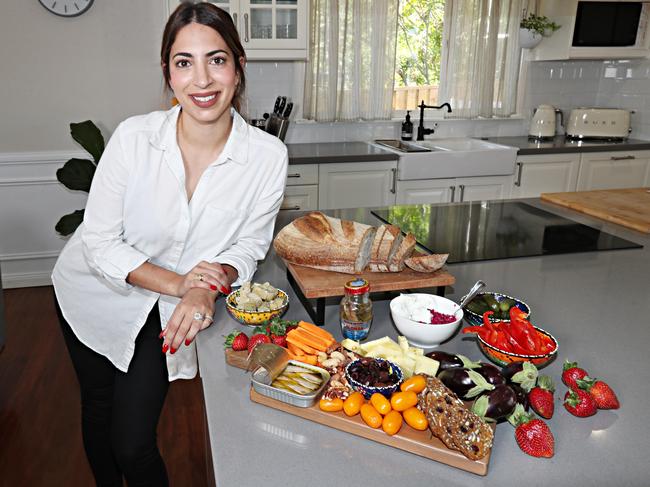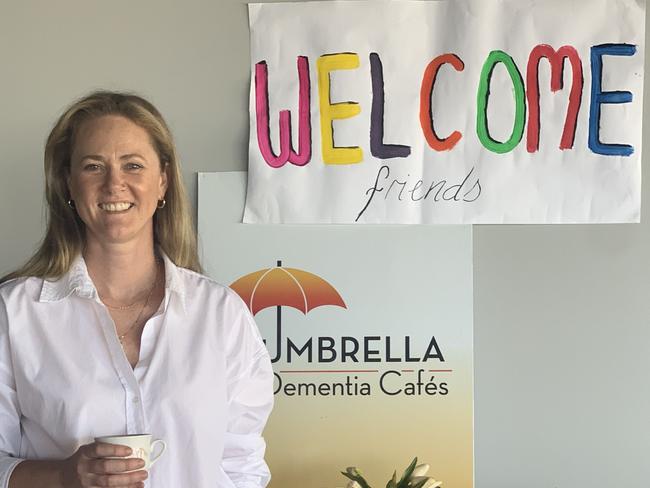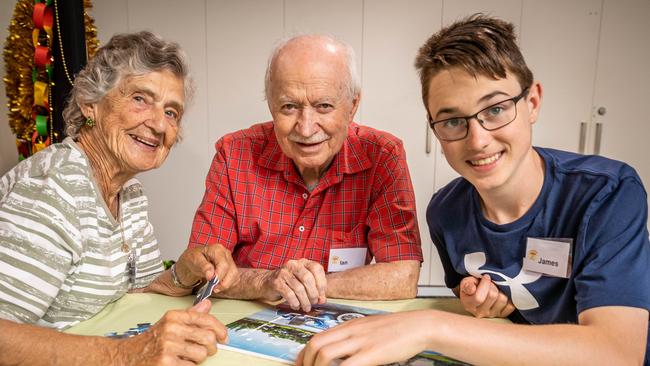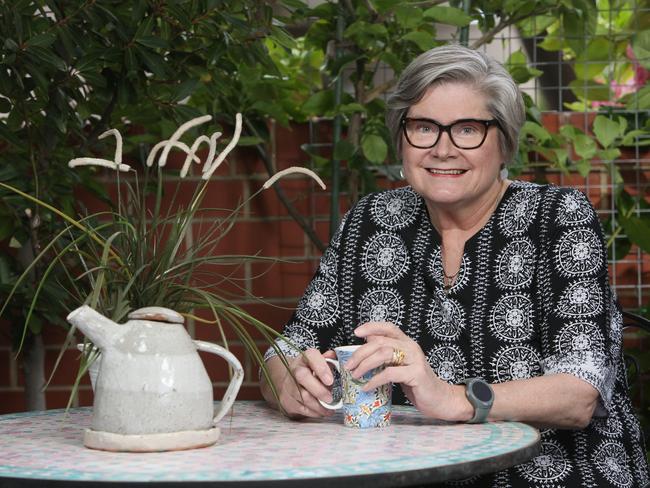Changes you can make now to lower the risk of dementia and Alzheimer’s disease
Simple lifestyle changes can help reduce your chance of developing dementia by up to 40 per cent. See the latest advice from health experts.
Health
Don't miss out on the headlines from Health. Followed categories will be added to My News.
Dementia is Australia’s second biggest cause of death — and as yet, there is no cure.
But, as Sue Dunlevy reports, there are plenty of things you can do to lower your risk of developing the debilitating memory-loss condition, which includes Alzheimer’s.
RISK FACTORS
The prestigious medical journal The Lancet identified 12 main risk factors for the disease in its 2017.
It found lifestyle modifications could reduce a person’s chance of dementia by about 40 per cent.
The journal also highlighted risk factors including high blood pressure, hearing impairment, smoking, obesity, depression, physical inactivity and diabetes. Less education early in life and low social contact can also contribute, along with excessive alcohol consumption, traumatic brain injury, and air pollution.
HOW TO MODIFY YOUR RISK
Exercise
Elderly people who do even just a small amount of exercise have greater brain functionality than those who don’t.
University of Southern California research found aerobic exercise — brisk walking, swimming, running, or cycling — boosted elderly adults’ cognitive function by three times more than older people who did a combination of aerobic exercise and strengthening exercises.
Conversely, a University of Sydney Brain and Mind Centre study found six months of strength training slowed, and even halted, the degeneration in the brain. Participants in the study did 45 minutes of strength training using dumbbells, weights or machines twice a week for six months. People in the control group who did not do weight training saw the hippocampus area in their brain shrink by 3 to 4 per cent.
Professor Henry Brodaty, from University NSW Centre for Healthy Brain Ageing, has just run a trial involving 6000 people and said high intensity exercise that raised the heart rate seemed to be better for maintaining brain functionality.
He is about to start analysing the data.
The World Health Organisation recommends 150 minutes of moderate-intensity aerobic exercise every week, or 75 weekly minutes of vigorous-intensity aerobic exercise, to keep dementia at bay.
Listen to UNSW Centre for Healthy Brain Ageing Professor Henry Brodaty below:
Diet
Dementia Australia’s Professor Michael Woodward recommends a Mediterranean diet that includes whole grains, fruits, vegetables, legumes, nuts, olive oil, fish and very small amounts of meat helps prevent the condition.
Alzheimer’s expert Professor Ralph Martin, from Sydney’s Macquarie University, agrees a Mediterranean-style diet can help fight cognitive decline.
Oily fish like salmon are is rich in omega-3 fatty acids, which is often found lacking in the brains of people with Alzheimer’s disease.
Berries, like strawberries blueberries, raspberries and blackberries and green vegetables and beetroot are high in antioxidants and help reduce inflammation.
Listen to Dementia Australia’s Professor Michael Woodward below:

Blood pressure
The Lancet study said people aged 40 and over should aim for systolic blood pressure of 130 or lower to delay or prevent dementia.
The Australian National University’s Centre for Research on Ageing found blood pressure at a “normal” reading of 120/80 is too high and could be damaging your brain.
The optimum blood pressure for a healthy brain is actually much lower — 110/70.
The journal found people who had higher blood pressure readings of 135/85, which is still within the normal range, had brains that scans showed were six months older than people who had readings in the optimum range.
This put them at risk not just of a less healthy brain but at increased risk of heart disease, stroke and dementia.
Smoking
Don’t smoke. Smoking increases the risk of strokes or bleeding in the brain, which can be precursors to dementia.
Get a hearing aid
Using hearing aids appears to reduce the excess risk of cognitive decline from hearing loss.
Alcohol
Excessive alcohol consumption can lead to brain damage and it may also cause a rare type of dementia called Korsakoff syndrome. Drinking more than two bottles of wine a week increases the risk of dementia.
Obesity
Excess body fat increases inflammation and some research suggests it might contribute to the build-up of damaging proteins in the brain.
Social interaction
Stay socially active. University NSW Centre for Healthy Brain Ageing said research shows the number of people a person interacts frequently is associated with greater short-term memory capacity. The research by Prof. Brodaty, Dr Nicole Kochan and Professor Perminder Sachdev found people who had fewer than five regular face-to-face contacts per month scored lower in tests of attention, processing speed, and language than people who had 11 or more face-to-face contacts.
Brain training
Professor Michael Valenzuela at the University of Sydney’s research shows brain training — even something as simple as doing a puzzle — can lead to improved cognition. However, the training has to work multiple functions of the brain including visual, verbal and working memory. It should be structured. Experts recommend online brain training products including like CogniFit and Neuronation.
WHAT IS YOUR RISK OF DEVELOPING DEMENTIA?
The prevalence of dementia doubles every five years after the age of 60. The risk is around two per cent at age 60 to 64 but grows to 20 per cent by age 80 and 30 per cent by age 90. University NSW research found 50 per cent of people aged over 100 have dementia.
IS IT ALZHEIMER’S OR JUST FORGETFULNESS?
It’s normal to forget where your keys are, or, after a big night out, forget where you parked your car but that’s not necessarily due to Alzheimer’s.
“Alzheimer’s is where a person is having progressively greater and wider range of memory symptoms. They can’t remember whether they turned the light off or can’t remember what they said to their partner yesterday,” Prof. Woodward said.
“Their partner may notice they’re repeating what they’ve just said. They forget who the characters are on a TV show they’re watching or forget that they watched it. They might get lost when they’re driving, even to familiar places. Where you’ve got a range of significant memory problems, that’s the time to go and speak to your GP.”

HOW IS DEMENTIA DIAGNOSED
Only about 30 per cent of people who have Alzheimer’s are formally diagnosed.
From November, Medicare began paying for a glucose PET scan to diagnose Alzheimer’s disease.
“I would think we have two million Australians who should be having this scan to either diagnose or rule out Alzheimer’s disease,” Prof. Woodward said.
An amyloid PET scan that visualises plaques present in the brain, which are prime suspects in damaging and killing nerve cells in Alzheimer’s, is also used to diagnose the condition.
Cognitive tests including the Montreal Cognitive Assessment (MOCA), the Mini-Mental State Examination (MMSE) test and the CogAT test are used by doctors. A poor score on any one of these tests should lead the GP to refer the patient to an appropriate specialist or memory clinic.
WHAT HAPPENS AFTER DIAGNOSIS
The University of NSW Centre for Healthy Brain Ageing has developed a website called forwardwithdementia.org.au to help people learn what to do next.
It has separate portals for the patient, the family member and for healthcare practitioners. People can get six sessions free of charge from Dementia Australia once they receive the diagnosis.
Group cognitive stimulation therapy has been found to have the same positive effect as the drugs used for Alzheimer’s disease.
People with the condition can access assistance dogs to help them with tasks like finding objects and keeping them calm in public.
Cognitive rehabilitation helps people stay independent at home showing them how to cook if they’re forgetful or manage their emails.
Occupational therapists can do home visits and work out strategies to compensate for the deficits such as how to get dressed or do up buttons (substitute with velcro).
HOW LONG WILL YOU LIVE WITH DEMENTIA?
If you are aged 95 you will probably live for a year or two, said Prof. Woodward. If you’re 60, it might be 10 years. The average is about four or five years.
If you or your family need help with dementia you can call Dementia Australia’s helpline 1800 100 500.
YOUNG AUSSIES HELPING OTHERS WITH DEMENTIA
They are volunteers in shining armour — most of them not even old enough to drive a car.
But these schoolchildren are helping transform the lives of dementia sufferers.
They are part of a groundbreaking program, set up by aged care nurse Kirsty Porter, who visited a dementia cafe while on holiday in the UK and was so overwhelmed went on to set up five in Australia.
“I decided in 2017 I would work night duty to pay for a year’s worth of cafes, one a month at that first location,” she said.
Each cafe meets twice a month for two hours and includes a half-hour meet and greet.
Community volunteers create activities linked to the interest of at least one member of the group.
For example, if one person with dementia used to be a mechanic the volunteers may bring an engine into the room.

The students got their call up after the first cafe in Melbourne was so popular Ms Porter turned to the school next door for help.
More than 300 schoolchildren have since participated.
They have also been educated in the classroom about what is dementia, how your brain works and how to communicate with someone with a brain disease, destigmatising the condition.
“They’ve learned dementia is … not a locked environment. Dementia is John or Peter, dementia is somebody who loves to listen to the Beatles on the weekend,” she said.
“They ask questions, they compare it to their own lives and then they say, oh, this is fine, this needs support, we can do that, that’s not a problem.”
During Covid lockdowns participants were trained in how to use zoom so they could continue to meet virtually.
“Every zoom was dedicated to a topic. So our wedding days, or our first car. We talked about war stories or where you grew up so everybody had an opportunity to tell a story,” Ms Porter said.
Carers are helping each other learn to cope with the difficult behaviours of their loved ones in the same program.
The group is now run as a charity called Umbrella Dementia Cafes.
‘SHE PUT HER SHOES AND HANDBAG IN THE FRIDGE’
As a teenager, Matthew Armstrong lost his grandmother to dementia — and was shocked at how fast she deteriorated.
“She started putting her shoes and handbag in the fridge and within a year was in an aged care home. It was really traumatising,” the now 33 year old said.
“She was heavily involved in my life and it really affected me.”
As the F45 gym manager in Bondi in Sydney, Mr Armstrong, does a high intensity workout three to four times a week.

He was heartened to hear of new research showing how important exercise could be in preventing dementia.
“I do it because it’s my job to set an example and it is the best way to stay in shape,” he said.
“It takes only 45 minutes and raises your endorphins for the entire day. And if you pair it with resistance training it means you can live injury free as you get older.”
His grandmother’s generation lived off fish and chips and exercising at a gym was not a “thing”.
“There is such a big emphasis now on eating clean, exercising, meditation and healthy lifestyle choices that were not there in my grandma’s generation,” he said.
‘I WOULD SAY THERE IS HOPE’
Ann Pietsch was employed by her local council to look after people living with dementia when she got a shock diagnosis of the condition herself.
The Adelaide-based nursing administrator was just 59 when she was diagnosed initially with early onset Alzheimer’s disease. It later turned out to be Lewy body disease.
Lewy body dementia (LBD) is the third most common type of dementia after Alzheimer’s disease and vascular dementia. It is linked to the same abnormalities as Parkinson’s disease.
Ms Pietsch said she noticed something was wrong when she had difficulty managing rosters and all of a sudden could not remember how she had worked out figures in her budget.
She struggled to remember the names of people she worked with and even simple tasks like mopping the floor defeated her.

Her hobbies of knitting and embroidery became too hard.
Then there were frightening dreams and hallucinations in her sleep.
“I can’t walk in a straight line. I wobble and turning is hard and my sense of smell and taste were affected. I’ve gone from being somebody who really loved food and loved cooking to being somebody who is put off by the smell of something cooking,” she said.
Her background helping people with dementia meant Ms Pietsch was able to get help from a neuropsychiatrist.
She switched to a Mediterranean diet, joined a special gym for people with Parkinson’s disease and continued to do her Sudoko puzzles.
A great believer in using her brain as much as possible to generate new connections between brain cells she said her job as an advocate at Dementia Australia has helped her through the 10 years since her diagnosis.
“I would say to everyone that there is hope – it’s just another thing to learn to live with. People learn to live with cancer, they learn to live with disabilities of all sorts, but they can also live a full life and it’s the same for a person living with dementia,” she said.
.
More Coverage
Originally published as Changes you can make now to lower the risk of dementia and Alzheimer’s disease





